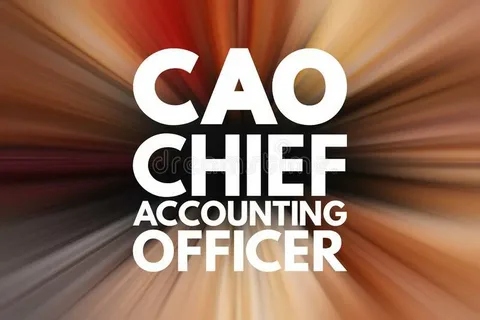CAO (Chief Accounting Officer): Career Path, Skills, and Top Certifications

Accounting
Imagine you’re leading the accounting function of a large organization.
You’re reviewing financial statements, audit reports, and policy updates when questions arise from the board:
Are our accounting policies compliant with IFRS?
Are all journal entries properly documented?
How reliable are our earnings reports to investors?
That’s when you realize your job is not just about reporting numbers, it’s about building trust.
Welcome to the world of the Chief Accounting Officer (CAO) the guardian of accuracy, transparency, and financial integrity.
Who Is a CAO?
A Chief Accounting Officer (CAO) oversees all accounting operations and ensures compliance with international standards.
The CAO’s mission is to maintain the credibility of financial data and align accounting practices with the company’s strategic vision.
Core Responsibilities:
- Lead financial reporting and closing processes.
- Ensure compliance with IFRS or GAAP standards.
- Supervise audits and manage relationships with external auditors.
- Develop and enforce accounting policies and controls.
- Provide accurate insights for executive decision-making.
CAO vs CFO: What’s the Difference?
While both roles are executive-level, they focus on different missionsCAO vs CFO:
|
Category |
CAO |
CFO |
|
Core Focus |
Accounting, compliance, reporting |
Finance, planning, strategy |
|
Scope |
Internal – operations & controls |
Internal & external – growth & funding |
|
Objective |
Accuracy and credibility |
Profitability and expansion |
|
Key Strengths |
Standards, governance, accuracy |
Leadership, analysis, strategy |
A CAO ensures the integrity of every number,
A CFO drives the direction behind those numbers.
Key Skills for Success as a CAO
- Deep understanding of IFRS / GAAP.
- Leadership in managing accounting teams.
- Proficiency in ERP and BI tools.
- Strong communication with executives and auditors.
- Risk management and internal control expertise.
The best CAOs are not just accountants they’re strategic guardians of corporate trust.
Career Path to Become a CAO
The journey often begins with hands-on accounting and evolves toward leadership Career Path to Become a CAO:
Accountant → Senior Accountant → Accounting Manager → Financial Reporting Director → CAO
Alternative route:
Internal Audit Manager → Finance Director → CAO
Each stage requires continuous learning, technical mastery, and executive communication skills.
Top Certifications for CAOs
Top Certifications for CAOs incloude:
- CPA (Certified Public Accountant) – Gold standard for financial reporting and auditing.
- ACCA (Association of Chartered Certified Accountants) – Globally recognized for IFRS expertise.
- CMA (Certified Management Accountant) – Ideal for integrating accounting with strategic planning.
- CIA (Certified Internal Auditor) – Strengthens governance and internal control.
- MBA (Master of Business Administration) – Builds leadership and strategic insight.
Combining a technical certification (CPA/ACCA) with a strategic one (MBA/CMA) creates the perfect executive blend.
Why Become a CAO?
Because as a CAO, you are:
- The voice of financial integrity.
- The bridge between compliance and strategy.
- The foundation of stakeholder trust.
In an era of transparency and digital transformation, skilled CAOs are more vital than ever.
Take the Next Step with 360 Business Partners
Advance your career and prepare for executive leadership with expert-led programs at 360 Business Partners.
Get hands-on training for CPA, ACCA, CMA, and MBA, delivered by certified professionals.
📧 info.egy@360business-partners.com
📞 +20 15 69189796 | +966 59 935 4746
Be the trusted leader behind every number
Related Articles
Explore Articles on Finance, Accounting, and Career Growth


